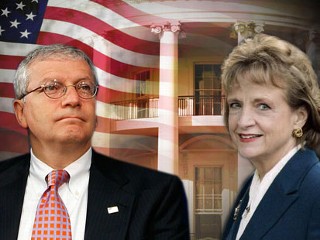Russia's defiance in the Caucasus has brought down the curtain on Bush senior's new world order - not before time
Seumas MilneIf there were any doubt that the rules of the international game have changed for good, the events of the past few days should have dispelled it. On Monday, President Bush demanded that Russia's leaders reject their parliament's appeal to recognise the independence of South Ossetia and Abkhazia. Within 24 hours, Bush had his response: President Medvedev announced Russia's recognition of the two contested Georgian enclaves.
The Russian message was unmistakable: the outcome of the war triggered by Georgia's attack on South Ossetia on August 7 is non-negotiable - and nothing the titans of the US empire do or say is going to reverse it. After that, the British foreign secretary David Miliband's posturing yesterday in Kiev about building a "coalition against Russian aggression" merely looked foolish.
That this month's events in the Caucasus signal an international turning point is no longer in question. The comparisons with August 1914 are of course ridiculous, and even the speculation about a new cold war overdone. For all the manoeuvres in the Black Sea and nuclear-backed threats, the standoff between Russia and the US is not remotely comparable to the events that led up to the first world war. Nor do the current tensions have anything like the ideological and global dimensions that shaped the 40-year confrontation between the west and the Soviet Union.
But what is clear is that America's unipolar moment has passed - and the new world order heralded by Bush's father in the dying days of the Soviet Union in 1991 is no more. The days when one power was able to bestride the globe like a colossus, enforcing its will in every continent, challenged only by popular movements for national independence and isolated "rogue states", are now over. For nearly two decades, while Russia sunk into "catastroika" and China built an economic powerhouse, the US has exercised unprecedented and unaccountable global power, arrogating to itself and its allies the right to invade and occupy other countries, untroubled by international law or institutions, sucking ever more states into the orbit of its voracious military alliance.
Now, pumped up with petrodollars, Russia has called a halt to this relentless expansion and demonstrated that the US writ doesn't run in every backyard. And although it has been a regional, not a global, challenge, this object lesson in the new limits of American power has already been absorbed from central Asia to Latin America.
In Georgia itself, both Medvedev's recognition of Abkhazia and South Ossetia's independence and Russia's destruction of Georgian military capacity have been designed to leave no room for doubt that the issue of the enclaves' reintegration has been closed. There are certainly dangers for Russia's own territorial integrity in legitimising breakaway states. But the move will have little practical impact and is presumably partly intended to create bargaining chips for future negotiations.
Miliband's attempt in Ukraine, meanwhile, to deny the obvious parallels with the US-orchestrated recognition of Kosovo's independence earlier this year rang particularly hollow, as did his denunciation of invasions of sovereign states and double standards. Both the west and Russia have abused the charge of "genocide" to try and give themselves legal cover, but Russia is surely on stronger ground over South Ossetia - where its own internationally recognised peacekeepers were directly attacked by the Georgian army - than Nato was in Kosovo in 1999, where most ethnic cleansing took place after the US-led assault began.
There has been much talk among western politicians in recent days about Russia isolating itself from the international community. But unless that simply means North America and Europe, nothing could be further from the truth. While the US and British media have swung into full cold-war mode over the Georgia crisis, the rest of the world has seen it in a very different light. As Kishore Mahbubani, Singapore's former UN ambassador, observed in the Financial Times a few days ago, "most of the world is bemused by western moralising on Georgia". While the western view is that the world "should support the underdog, Georgia, against Russia ... most support Russia against the bullying west. The gap between the western narrative and the rest of the world could not be clearer."
Why that should be so isn't hard to understand. It's not only that the US and its camp followers have trampled on international law and the UN to bring death and destruction to the Middle East, Afghanistan and Pakistan. In the early 1990s, the Pentagon warned that to ensure no global rival emerged, the US would need to "account for the interests of advanced industrial nations to discourage them from challenging our leadership". But when it came to Russia, all that was forgotten in a fog of imperial hubris that has left the US overstretched and unable to prevent the return of a multipolar world.
Of course, that new multipolarity can easily be overstated. Russia is a regional power and there is no imminent prospect of a serious global challenger to the US, which will remain overwhelmingly the most powerful state in the world for years to come. It can also exacerbate the risk of conflict. But only the most solipsistic western mindset can fail to grasp the necessity of a counterbalance in international relations that can restrict the freedom of any one power to impose its will on other countries unilaterally.
One western response, championed by the Times this week, is to damn this growing challenge to US domination on the grounds that it is led by autocratic states in the shape of Russia and China. In reality, western alarm clearly has very little to do with democracy. When Russia collapsed into the US orbit under Boris Yeltsin, his bombardment of the Russian parliament and shamelessly rigged elections were treated with the greatest western understanding.
The real gripe is not with these states' lack of accountability - Russian public opinion is in any case overwhelmingly supportive of its government's actions in Georgia - but their strategic challenge and economic rivalry. For the rest of us, a new assertiveness by Russia and other rising powers doesn't just offer some restraint on the unbridled exercise of global imperial power, it should also increase the pressure for a revival of a rules-based system of international relations. In the circumstances, that might come to seem quite appealing to whoever is elected US president.
Original here
 In 2001 and 2003, Sen. John McCain (R-AZ) opposed President Bush’s tax cuts, arguing that he couldn’t “in good conscience support a tax cut in which so many of the benefits go to the most fortunate among us.” But since then, McCain has ditched his concern about policies tilted towards the wealthy and now wants to double Bush’s tax cuts.
In 2001 and 2003, Sen. John McCain (R-AZ) opposed President Bush’s tax cuts, arguing that he couldn’t “in good conscience support a tax cut in which so many of the benefits go to the most fortunate among us.” But since then, McCain has ditched his concern about policies tilted towards the wealthy and now wants to double Bush’s tax cuts.

 DENVER -- He might not have had the marquee billing of a Mark Warner or a Hillary Clinton, but Democratic Rep. Dennis Kucinich (D-OH) nonetheless whipped his party faithful into a frenzy Tuesday evening.
DENVER -- He might not have had the marquee billing of a Mark Warner or a Hillary Clinton, but Democratic Rep. Dennis Kucinich (D-OH) nonetheless whipped his party faithful into a frenzy Tuesday evening.

